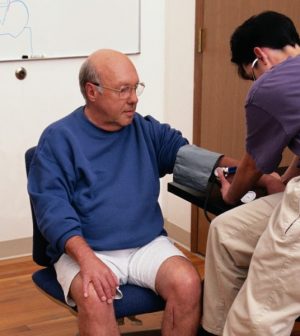- Could Your Grocery Store Meat Be Causing Recurring UTIs?
- Are You Making This Expensive Thermostat Error This Winter?
- Recognizing the Signs of Hypothyroidism
- 10 Strategies to Overcome Insomnia
- Could Artificial Sweeteners Be Aging the Brain Faster?
- Techniques for Soothing Your Nervous System
- Does the Water in Your House Smell Funny? Here’s Why
- Can a Daily Dose of Apple Cider Vinegar Actually Aid Weight Loss?
- 6 Health Beverages That Can Actually Spike Your Blood Sugar
- Treatment Options for Social Anxiety Disorder
7 Signs You’d Benefit From a Fitness Assessment

You might be excited to begin an exercise program for better health, but for some people, getting a fitness assessment first is the right way to get started.
As part of this exam you’ll learn about appropriate exercises and safety guidelines, such as workout duration and the intensity level best for you.
During the assessment, key components of your fitness will be measured and your risk factors for heart disease and other health conditions will be evaluated. The findings will provide you your unique exercise road map and serve as a baseline from which to track your progress.
A fitness assessment evaluates the following areas of conditioning:
- Cardiovascular fitness.
- Muscular strength.
- Muscular endurance.
- Flexibility.
- Balance.
Who needs this type of assessment?
The American College of Sports Medicine recommends a simple self-evaluation to help you decide. The more heart disease risk factors you have — like high blood pressure and high cholesterol, a family history of heart disease, a smoking habit, obesity, or pre-diabetes — the more important it is to check in with your doctor or another qualified health professional.
If you already have heart, lung or kidney disease, asthma or arthritis, it’s essential to work hand-in-hand with your health-care provider to develop an exercise program for wellness.
Talk to your doctor first if you answer yes to any of these seven questions:
- Do you have a heart condition?
- Do you feel pain in your chest during exertion?
- Do you have chest pain when not exerting yourself?
- Do you ever lose your balance or feel dizzy?
- Do you have any bone or joint issues?
- Are you on prescription drugs for high blood pressure or a heart condition?
- Do you have any other health issues that could be affected by exercise?
Even if you don’t have these risk factors, when you’re new to exercise, the safest way to start is slowly and at a low intensity. Learn proper technique to avoid injury and prevent muscle strain that could lead you to give up before you really get going.
More information
The American College of Sports Medicine has more on the merits of getting a professional fitness assessment.
Source: HealthDay
Copyright © 2026 HealthDay. All rights reserved.










